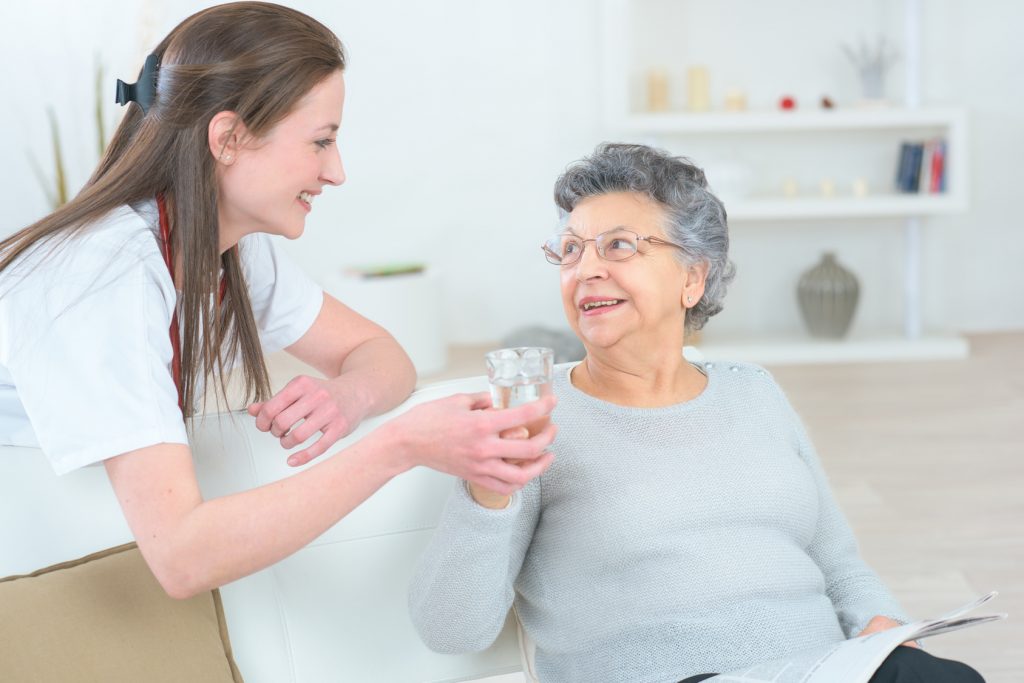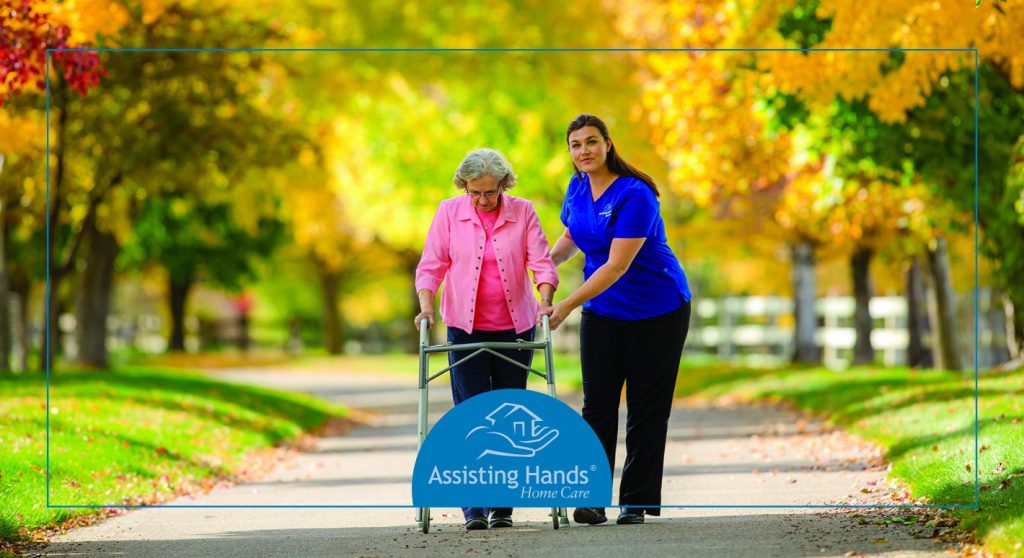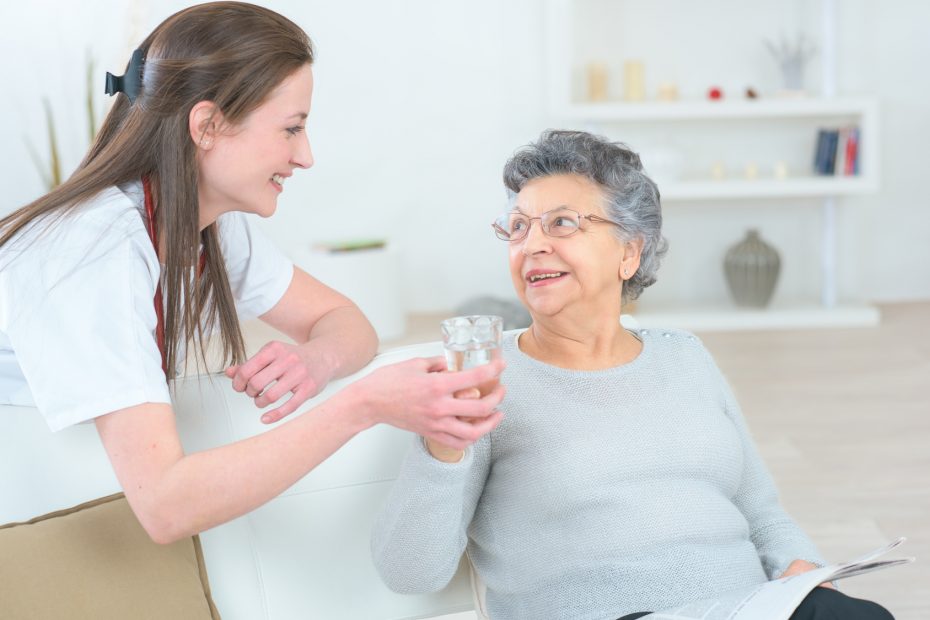
Water is one of life’s basic essentials. In fact, water makes up to 60 percent of the human body and contributes to the efficiency of major bodily functions. Seniors, as a result, should avoid dehydration by drinking enough fluids each day. Here’s how to ensure proper daily hydration.
What is the importance of drinking water?
Along with food and air, water is vital to sustaining life. The brain and heart consist of 73 percent water; the lungs are about 83 percent water; the skin contains 64 percent water; and 79 percent of water is in the kidneys and muscles. Even bones contain 31 percent water.
While much of the human body is made up of water, this essential fluid also is necessary to keep the body functional. Water is a nutrient for cells, acting as a building material. Water regulates internal body temperature through sweating and respiration. Water also forms saliva.
Fluids, such as water, help the body flush out waste, particularly through urination. Water lubricates the joints. Plus, water serves as a shock absorber for the brain and spinal cord. Water dissolves a range of substances, allowing cells to use minerals and chemicals in biological processes.
What is dehydration?
As is evident, drinking enough water supports bodily functions. When the body does not receive the fluids it needs, dehydration occurs. A series of health complications can emerge when seniors fail to drink the recommended amounts of fluids, like water, every day.
Symptoms of dehydration range from mild to life-threatening. Urinary tract infections, heat stroke, kidney failure, and cardiovascular issues can arise from not drinking enough fluids. Blood clot complications can develop. Dehydrated seniors are less able to ward off infections and heal from injuries.
Dehydration among seniors is not uncommon. As much as 40 percent of seniors may be chronically dehydrated. Older adults are likely to experience dehydration due to naturally diminished thirst, taking medications that increase the risk of dehydration and changes to body composition.
How much fluids do seniors need?
Older people may drink less fluids than their bodies need, since thirst diminishes with age. This fact makes it even more important that seniors aim to drink the recommended amounts of fluids to stay hydrated and healthy—even if they do not feel thirsty.
A general rule is that seniors should drink eight 8-ounce glasses of water daily. Active older adults may need more if they perspire after exercising in the heat. Some seniors may tolerate less than the recommended amount. Seniors with medical issues, like heart failure, may have specific fluid needs.
What fluids are recommended?
Water is the ideal fluid to ensure adequate hydration on a daily basis. Seniors may tire of plain water, making it helpful to add flavor to the glass. Drop fresh fruits, like raspberries or blueberries, in the water to enhance its flavor and encourage the senior to drink more.
Juices can be an alternative to water. However, caregivers are advised to be careful about how much juice they serve the senior. Many juices have a high sugar content, which can be harmful to seniors with diabetes. Alternatively, serve a glass containing 50 percent juice and 50 percent water.
Teas and coffees are known to have a slight diuretic effect and should, therefore, be consumed in moderation. Many nutritious foods, like watermelon, cucumbers, zucchini and strawberries, contain a high water content—as well as vitamins—and will help hydrate the senior.
How do caregivers encourage seniors to drink fluids?
Hydration should be an all-day event for older people. For example, seniors are encouraged to drink one full glass of fluids with every meal. Rather than drinking all eight ounces at once after lunch or dinner, sip the water, juice, or milk between bites.
When taking medications, drink a glass of water. (As mentioned earlier, seniors with certain medical conditions should consult a physician to determine optimum fluid intake.) Prior to and after exercise, drink a glass of water. In the afternoon, a cup of low-fat soup serves as a delicious, hydrating snack.
Drinking eight ounces of water at once may be difficult for some seniors. A full glass of water may cause older adults some minor issues, such as bloating and a need to run to the bathroom. Instead of drinking the full glass, seniors are advised to take sips throughout the day.
Caregivers may also purchase a special mug or cup from which the senior enjoys drinking and is able to keep by her side throughout the day. The availability of spill-proof cups or adaptive drinking aids is plentiful, some even designed for use by seniors with mobility issues or arthritis.

Seniors with existing health issues may require extra support to ensure they remain hydrated every day. Alzheimer’s disease and other forms of dementia can make remembering to drink fluids a daily challenge. Assisting Hands Home Care caregivers ensure seniors remain hydrated and healthy.
As a leader in elder care, our home care agency is staffed with a team of knowledgeable and experienced professionals who are dedicated to meeting the nonmedical care needs of seniors. We help older people with all the activities of daily living, which allows them to live at home longer.
Caregiver responsibilities include preparing balanced meals and ensuring proper hydration, shopping for fresh groceries (including foods with a high water content), providing transportation to doctors’ offices and light housekeeping. We also serve as pleasant companions, deterring loneliness and social isolation.
Assisting Hands Home Care services are flexible. We offer respite care, post-operative care, 24-hour care, live-in care, and overnight care. Our compassionate Alzheimer’s and dementia care support seniors with memory loss conditions in the comfort and familiarity of their home environment.
Your elderly loved one will benefit from the attention and care from the professionals at Assisting Hands Home Care. We are privileged to serve seniors living in Deerfield, Buffalo Grove, Grayslake, Highland Park, Lake Forest, Lake Zurich, Libertyville, Lincolnshire, Mundelein, Round Lake Beach, Vernon Hills, IL, and surrounding communities. Call us at (224) 268-9068 to schedule an in-home consult and start quality, non-medical home health care.
















